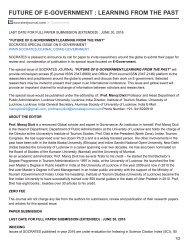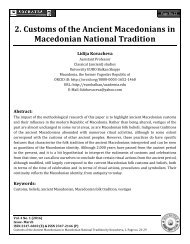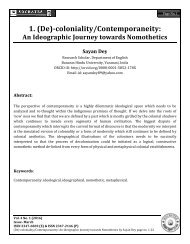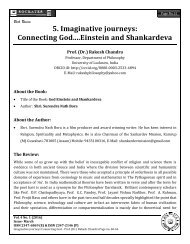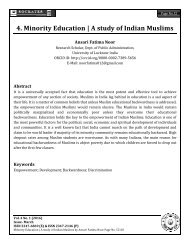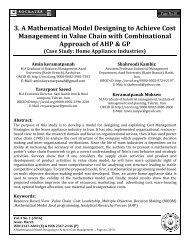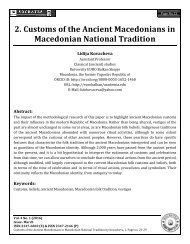1
Create successful ePaper yourself
Turn your PDF publications into a flip-book with our unique Google optimized e-Paper software.
Page No.6<br />
the cave and he sees the sunlight sipping through the crevices illuminating the dead darkness which<br />
is present inside and he declares, ‘Wow! The sunlight is so bright and energetic.’ But the question is<br />
does he sees the sunlight or the reflection of the sunlight? And if it is well analyzed the answer will<br />
obviously go in favour of the second. It is at this very point where the differences between reality and<br />
illusion exhaust in a very spontaneous and unconscious way.<br />
The colonizers, irrespective of time and space, basically invaded the regions for the sake of<br />
trade and commercial benefits. The massive industrial upsurge in Europe was well complimented<br />
with the rise of raw materials to be consistently fed to the industries and factories for rapid supply of<br />
complete goods. In order to avoid over-exhaustion exhaustion of Europe the westerners turned towards the rest<br />
of the world and besides Americas found Asia and Africa as highly voluptuous and impregnated with<br />
endless raw sources. The commercial prosperity encouraged the colonizers to induce socio-economic<br />
and political transformations ons and it was largely influenced by the concept of Leviathanism which<br />
already waved endless debates and controversies during the 17 th century. But Thomas Hobbes,<br />
besides several other political philosophers played a crucial role towards propagating the concept<br />
globally and is still being followed in different re-contextualized forms. Thomas Hobbes who was a<br />
precursor of Social Contract Theory which was later on funneled by Jean Jacques Rousseau initiated<br />
the concepts of summum bonum and summum malum.<br />
Summum Bonum means greatest good which according to Hobbes was impossible to achieve<br />
as every individuals have their own versions of good which persists in conflict with each other and<br />
also plays a pivotal role towards inducing warfare. The other side of it lies in summum malum which<br />
resorts to the greatest evil the ultimate fear of a painful death. Thus Hobbes predicts a malevolent<br />
future psycho-physically crippled:<br />
In such condition there is no place for industry, because the fruit thereof is uncertain, and<br />
consequently, not culture of the earth, no navigation, nor the use of commodities that may be<br />
imported by sea, no commodious building, no instruments of moving and removing such things as<br />
require much force, no knowledge of the face of the earth, no account of time, no arts, no letters, no<br />
society, and which is worst of all, continual fear and danger of violent death, and the life of man,<br />
solitary, poor, nasty, brutish, and short.<br />
In order to avoid such a glum future he gives the proposal of the commonwealth which is one of the<br />
key ingredients towards the modern concept of hegemony which is an integral part of neocolonialism<br />
in the contemporary era. The implication of the term ‘commonwealth’ has always been<br />
self-contradictory because in order to avoid socio-political anarchy it encourages a compromise<br />
theory within which individuals should introduce self restraint by sacrificing a few of their own<br />
rights, explicitly or forcefully, to the higher institutional authority in return to seek protection for the<br />
Vol. 4 No. 1 (2016)<br />
Issue- March<br />
ISSN 2347-6869 (E) & ISSN 2347-2146 (P)<br />
(De)-coloniality/Contemporaneity: An Ideographic Journey towards Nomothetics by Sayan Dey page no. 1-22




